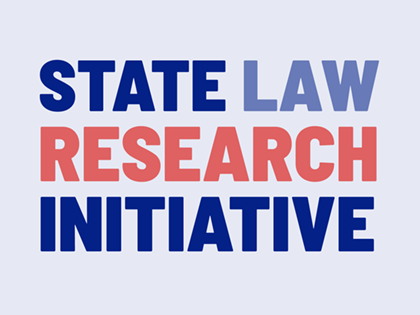
The movement to dismantle mass incarceration is not a new one. For decades, advocates have fought to reverse the extremely long prison sentences that are a major driver of widespread mass incarceration. More recently, though, there have been efforts to “pull new levers” in the fight against excessive criminal punishment. One of those levers – and the focus of the State Law Research Initiative’s work – is state courts and constitutions.
The mission of the State Law Research Initiative (SLRI) is to shape and strengthen state constitutional law to support individual rights against excessive punishments, with an emphasis on excessive prison terms and inhumane incarceration conditions. Under federal constitutional law controlled by an increasingly conservative U.S. Supreme Court, federal rights against excessive punishment have become almost non-existent. State courts and state constitutions represent another pathway to protecting these rights.
With research as the foundation of its work, SLRI’s strategies have grown over the last couple of years to include legal briefing, communications, and managing a network of scholars, advocates, and practitioners. The legal advocacy organization publishes academic articles and newsletters to bring attention to its research, and files briefings to get its legal theories in front of state courts. Kyle Barry, SLRI’s director, is also working to reach a broader audience by partnering with scholars on op-eds and speaking to reporters, as he did for a recent feature in The New Yorker.
“I think it’s clicked for a lot of people, in part because in the wake of the Dobbs decision overturning Roe from the U.S. Supreme Court. Reproductive rights obviously started to get a lot of state court attention, and there was a lot of recognition that ‘okay, now we have to go to state courts and state constitutions.’ So I think having abortion issues and a lot of electoral issues get national attention as state court issues has been helpful for people to recognize the importance of thinking about excessive punishment as a state court issue as well. Timing has been an important part of it.”
Recognizing the importance of the judges deciding cases in state courts, SLRI has also taken an active role in campaigns to increase the number of public defenders and civil rights lawyers with public defense experience to serve in federal and state courts. SLRI researched and analyzed the legal career of every active justice in every state supreme court, showing how state courts are largely dominated by former prosecutors and corporate lawyers. In addition to this report, SLRI does nationwide outreach to recruit and vet public defenders as potential judicial candidates, a “judicial pipeline” project that ensures public defenders will be considered to fill both state and federal vacancies. Since SLRI began this work, it has helped to identify over a dozen lawyers who are now presiding over federal courtrooms.
On top of all this, SLRI continues to produce and sponsor research and next month, it will host its first public-facing symposium at Rutgers University Law School, where an audience of lawyers, law students and professors, journalists and others will hear from expert speakers and panelists on this issue.
To learn more about SLRI’s work, visit its new website and sign up for newsletter updates.
